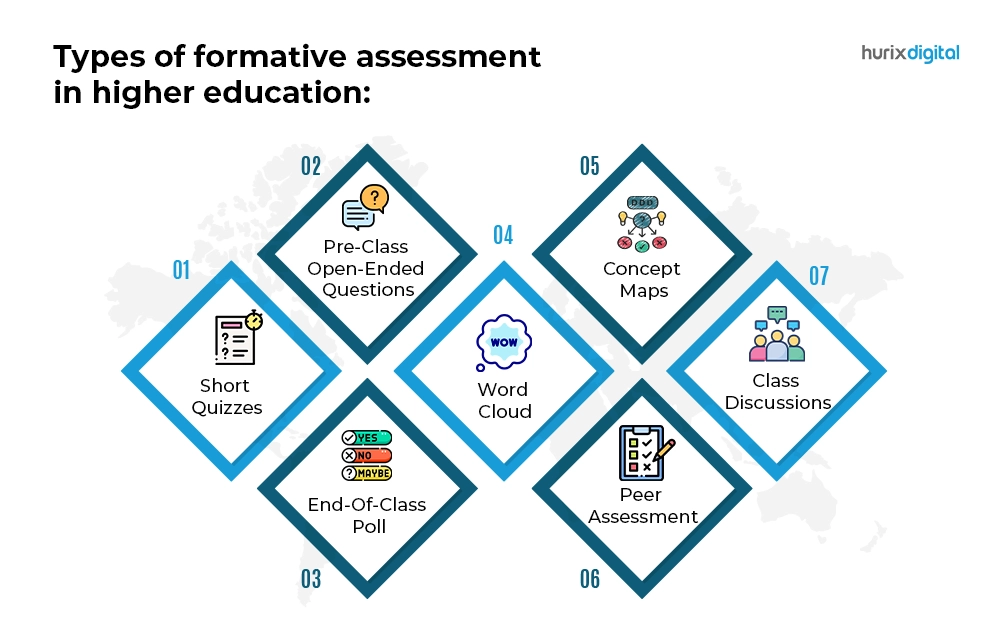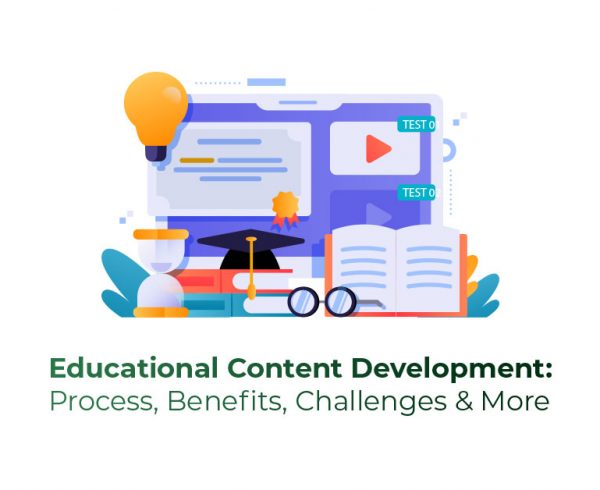Assessment and evaluation in higher education is not a recent phenomenon. Instructors have been conducting examinations since the earliest time to evaluate students’ understanding of a subject and monitor their progress.
However, the types of assessment in higher education have evolved over the years. While the traditional summative exams are still prevalent, instructors have started focusing on assessing students understanding during the learning process. This type of assessment is called formative assessment.
In this blog, we will discuss formative assessment in detail and understand its types and benefits.
Table of Contents:
- What Is Formative Assessment?
- Types Of Formative Assessments
- What Is Formative Assessment In Mathematics?
- Is Formative Assessment Graded?
- Create Interactive Formative Assessments With Hurix
- Frequently Asked Questions (FAQs)
What Is Formative Assessment?
Formative assessment is when educators evaluate the student’s knowledge as they learn. It involves creating a series of quick-fire questions and exercises to monitor the learner’s progress during the course.
The data collected from formative assessments help teachers understand the misconceptions or gaps in students understanding. They can use this insight to modify their teaching strategies to help students understand better.
Likewise, students can use formative assessment feedback to reflect on their learning and progress, identify their weaknesses, and adjust their study habits or approaches.
Unlike summative assessments, which occur at the end of a term, formative assessments are ongoing. Hence, they serve as a tool for improving learning rather than solely for grading purposes.
A recent study on 72 Iranian EFL (English as a Foreign Language) learners found formative assessment more effective on academic motivation, test anxiety, and self-regulatory skills than summative assessments. It underlines the importance of formative assessment in education.
Also Read: How to Devise an Effective Online Learning Assessment Strategy
Some formative assessment examples include:
- Asking students to write a concise summary of what they learned in class
- Taking a short quiz after a lesson to provide immediate feedback to students
- Conducting open-end discussions in the classroom related to a topic being taught
- Asking students to give feedback on their peers’ essays, projects, or presentations
Types Of Formative Assessments
Types of Formative assessments do not have a specific standard to follow. Hence, instructors have the flexibility to try different approaches and devise an effective assessment strategy.
If the education is online or remote, educators can opt for formative e-assessments. They have been found to help higher-education students monitor their progress and improve learning.
Educators can use offline techniques such as oral or peer assessments for in-person courses.
The commonly used types of formative assessment in higher education include:

-
Short Quizzes
A quiz is a great formative assessment approach, especially in online education. It will provide immediate feedback on students’ understanding of the concept taught.
Instructors can prepare short online quizzes for students during or after a lesson before moving them to the next level. You can also make the assessment more game-like and fun by including points and rewards, badges, or leaderboards.
-
Pre-Class Open-Ended Questions
Formative assessments can be as simple as asking students to recall what they learned in the previous class before starting a new one.
The questions need not be overly complex. You could simply ask open-ended questions like “What did you find most interesting about the topic?” or “What was its most difficult aspect?”.
It will allow students to recollect their thoughts and instructors to gauge their retention ability.
-
End-Of-Class Poll
Taking a classroom poll at the end is a good idea if you’ve just delivered a long lecture or performed an in-depth discussion on a topic. You can ask your students how informative the session was and whether they could grasp the concept.
The poll can be online with emoji ratings or simply a show of hands in the classroom. The insight from the survey can help teachers make timely adjustments to optimize learning outcomes.
-
Word Cloud
If you’re looking for a concise assessment, consider word cloud. Ask students to submit a one-word response to your questions regarding the concept or topic taught in class.
Word cloud encourages students to think carefully before submitting their answers and is more fun than lengthy answer assessments. Individual responses will provide instructors with dynamic visuals into the understanding levels of students.
-
Concept Maps
Another way to assess students is by asking them to create visual diagrams or maps to represent their understanding of a topic. It can be a valuable tool to help students draw hierarchies and interrelationships between different concepts.
-
Peer Assessment
In peer assessments, students evaluate each other’s work and provide feedback. It could be a project, presentation, or written assignment. Instructors could ask learners to highlight their peers’ strengths and provide suggestions for improvement.
These types of formative assessments allow room for self-reflection while also developing learners’ evaluation skills.
-
Class Discussions
Classroom discussion is a great way to increase student participation in the classroom. Open-end discussions and debates allow students to express their thoughts and opinion regarding a topic and foster an active learning environment.
Through such debates, instructors can learn a great deal about their students’ abilities and comprehension.
Also Read: Tips for Designing Math Books with InDesign: From Concept to Creation
Hurix Mini-Book:
Effective Training Techniques For Enterprises With Distributed Workforce
What Is Formative Assessment In Mathematics?
Formative assessment in the classroom need not be limited to theoretical courses but can also be applied to practical subjects. In mathematics, formative assessments, such as concept mapping, can help instructors assess learners’ critical thinking and problem-solving skills and support their mathematical development.
Some formative assessment examples in mathematics include:
- Observing and analyzing students’ mathematical problem-solving approaches in class.
- Administering brief quizzes or short answer questions to assess understanding of specific mathematical concepts or procedures
- Conducting group discussions to probe students’ thinking and reasoning in mathematical problem-solving
- Analyzing students’ responses to questions that require them to explain their reasoning and justify their solutions
Is Formative Assessment Graded?
Formative assessments are informal and do not contribute to a student’s final grade or academic records. Then what is formative assessment in education used for?
The assessment gathers information about students’ learning progress and guides teachers to the most beneficial teaching strategies. Teachers can use the information from formative assessments to provide targeted support to students so they obtain good grades in summative assessments.
Some educators may assign low-stakes or non-punitive grades to formative assessments to encourage student engagement and accountability. In such cases, the grade is often used to provide feedback and motivate students rather than to measure their final achievement.
Create Interactive Formative Assessments With Hurix
The importance of formative assessment cannot be undermined, especially in today’s online learning scenario. With the shift to remote education, where face-to-face interaction is limited, formative assessment becomes even more vital to get real-time information on student understanding and engagement.
With formative assessments, educators can promptly address students’ confusion and prevent their learning gaps from widening. In this context, K12 assessment companies, such as Hurix, can be of great help.
Hurix provides educators with the right digital assessment tools to design engaging formative and summative assessments that promote active learning and critical thinking. With interactive features like multimedia integration, gamification elements, and instant feedback, Hurix empowers educators to deliver innovative formative assessments that improve learning outcomes.
Get in touch to learn more!
Frequently Asked Questions (FAQs)
1. What are some examples of formative assessments?
A. Examples of formative assessments include asking students to write summaries, taking short quizzes for immediate feedback, conducting open-end discussions, peer assessments, concept maps, and class discussions.
2. Are formative assessments graded in higher education?
A. Formative assessments are typically not graded and do not contribute to a student’s final grade. They are used to gather information on learning progress, guide teaching strategies, and provide targeted support for better performance in summative assessments.
3. How can formative assessment be applied in mathematics education?
A. In mathematics education, formative assessments can involve observing problem-solving approaches, administering brief quizzes, conducting group discussions, and analyzing responses that require students to explain their reasoning and solutions.
4. What is the role of formative assessment in online education?
A. Formative assessment is crucial in online education to provide real-time information on student understanding and engagement. It helps educators address confusion promptly and prevent learning gaps from widening, promoting active learning and critical thinking.
5. Can formative assessment be used in both online and in-person education?
A. Yes, formative assessment can be adapted to both online and in-person education, with various techniques such as online quizzes and classroom discussions.











